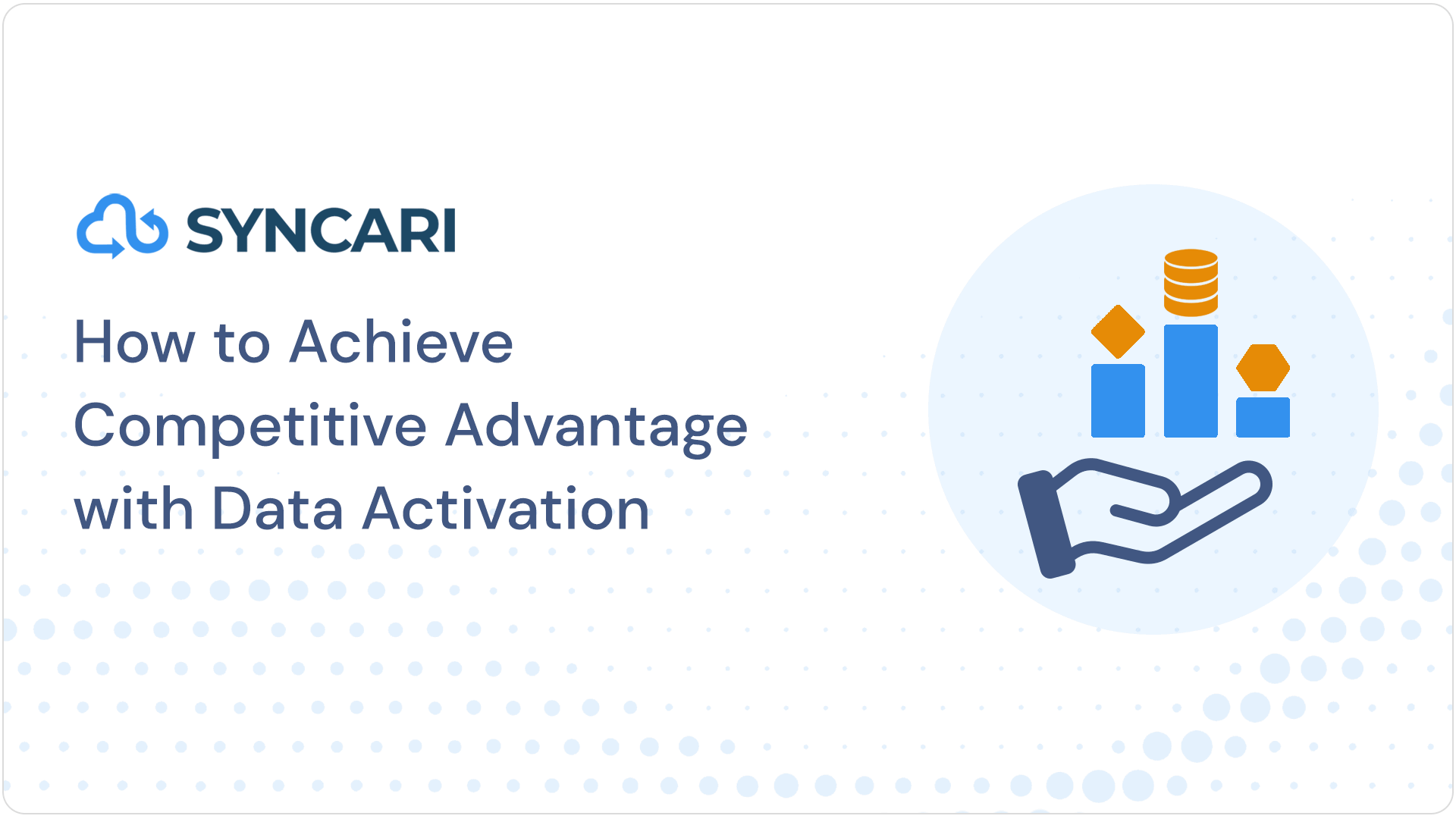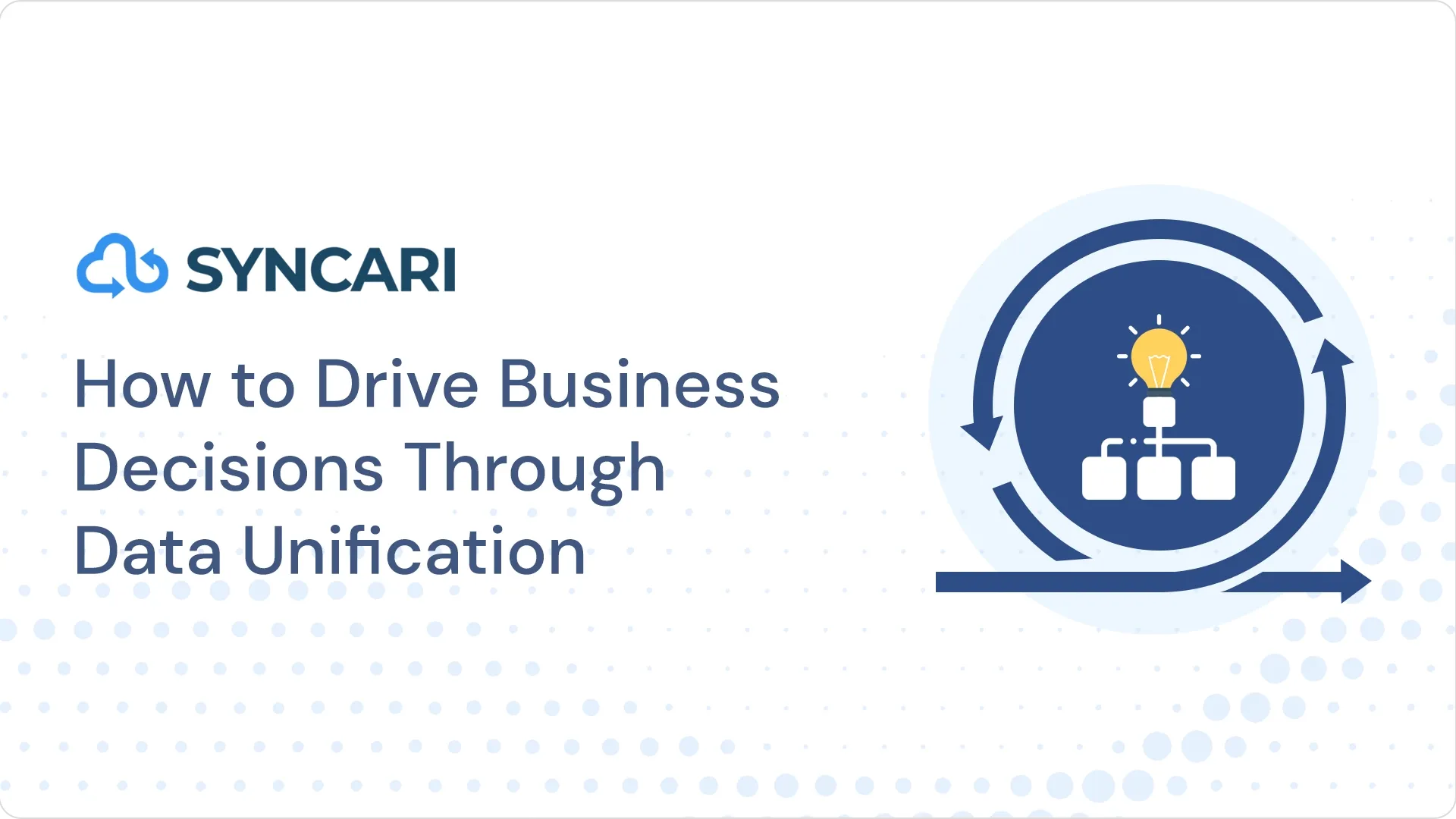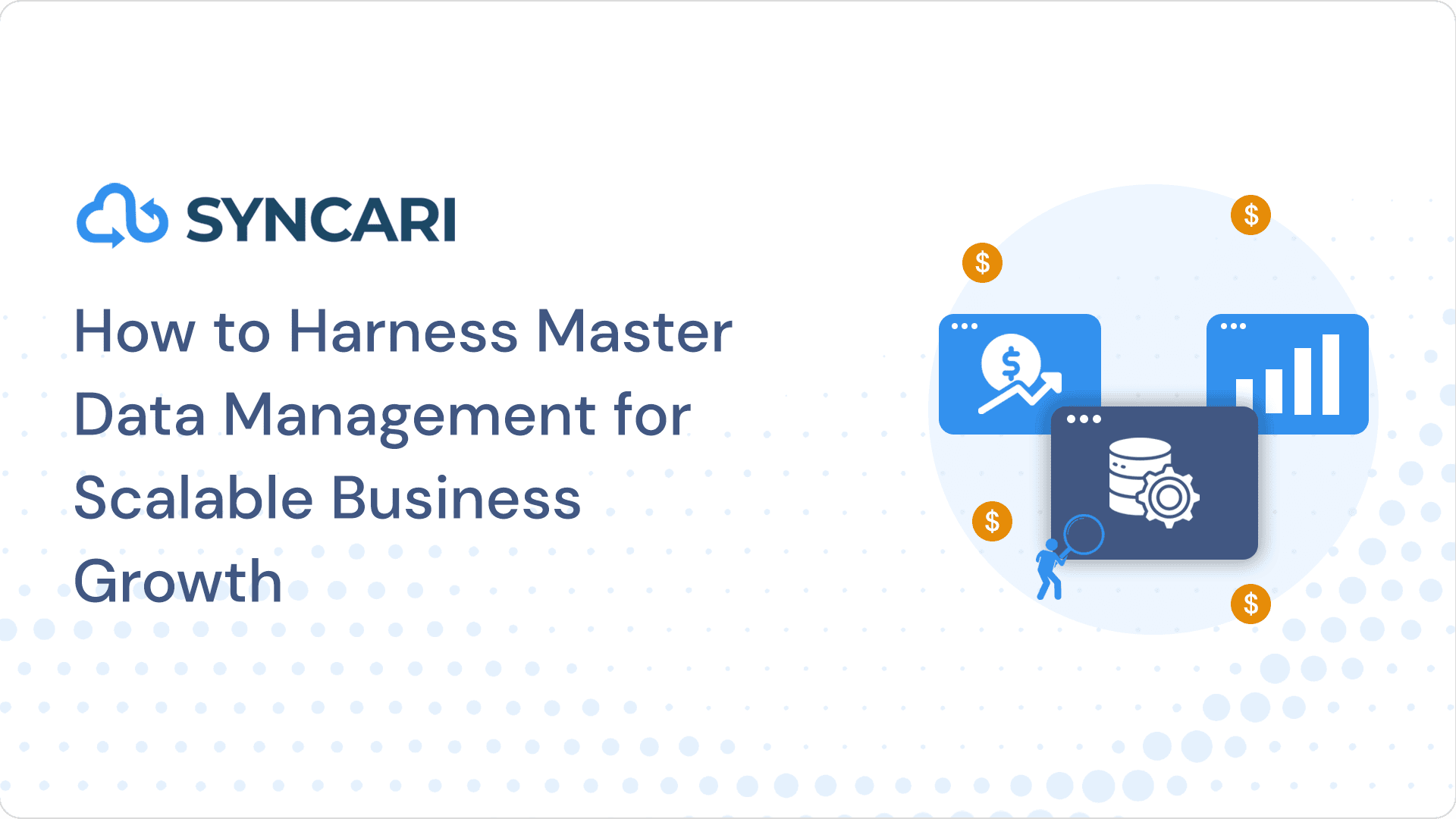Data is a precious entity for not only individuals but for businesses too. But, you might have experienced that managing data is not a cakewalk.
With the enormous amounts of data being processed today, it has become more and more challenging to analyze, manage, process and integrate the data for businesses to gain meaningful insight and use it to make informed decisions.
So for that, you need an efficient, simple and easy-to-use platform for your data management, integration and processing needs. This article will introduce Talend and Syncari, highlighting their features, benefits, and key differences.
Whether you are a large enterprise or a small business, understanding the capabilities of these platforms can help you make informed decisions about your data integration needs.
[ Related: It’s Official: Master Data Management is Dead ]
What is Talend?

Talend is a data integration and management platform that allows your business to access, process, transform and integrate data from various sources.
Talend helps you turn your data into business outcomes. Talend combines attributes like data integration, data quality and data governance under the umbrella of a single, straightforward, easy-to-use platform that works with any data architecture, source and format.
One of the critical features of Talend is its data quality capabilities. Data quality is ensuring that data is accurate, complete, and consistent. Talend offers a range of data quality tools that enable organizations to profile, cleanse, and standardize data.
These tools can be used to identify and correct data errors, improving the accuracy of analysis and decision-making. Talend also offers a data preparation feature that allows users to transform data into a format suitable for analysis.
Talend’s Features
Talend comes with many features. I have listed a few of them here:
- Data Integration: Talend offers various connectors to integrate data from multiple sources, including databases, cloud-based applications, and social media platforms.
- Data Governance: Talend’sTalend’s data governance tools can help your company to define and implement policies and procedures for managing data, including data access, data usage monitoring, and data quality enforcement.
- Easy to Use: Talend offers an intuitive, easy-to-use interface that requires no coding or programming skills, enabling non-technical users to manage and integrate data easily.
- Open-Source: Talend is an open-source platform meaning it is free to use and offers a group of users who contribute to its development and share best practices.
- Data Preparation: Talend offers a data preparation feature that allows users to transform data into a format that is suitable for analysis, including tools for data mapping, data aggregation, and data enrichment.
- Cloud-Native: Talend is cloud-native, meaning it can be used on-premises, in the cloud, or in a hybrid environment, making it highly flexible and scalable for your company’s requirements.
- Data Quality: Talend provides a range of data quality tools that can enable your company to profile, cleanse, and standardize data to ensure accuracy, completeness, and consistency.
- Master Data Management: Talend’s master data management tools enable businesses to manage their core data, including data modeling, profiling, and data stewardship, to ensure accuracy and consistency.
With these features, you can rest assured that Talend will be a powerful tool for your company’s data integration and management requirements.
While Talend is a powerful data integration and data management platform with all these features, Talend also comes with some disadvantages:
- Complexity: Talend can be complex, particularly for users who need to become more familiar with data integration and management concepts. Users may require training to understand and use its features effectively and comprehensively.
- Performance: Talend’sTalend’s performance can be impacted by large datasets or complex transformations. Ensuring that the hardware and infrastructure are optimized for the workload is crucial.
- Technical Support: Talend’s technical support may not be as responsive as some users would like. Some users have reported delays in receiving support from the vendor.
- Cost: Talend’s more advanced features are only available through paid subscriptions. The cost of these subscriptions can be a barrier for some organizations.
- Customization: Customizing Talend to meet specific requirements may require significant development efforts, as the software is not designed for customization out-of-the-box.
- Learning Curve: Talend may have a steep learning curve for users who need to become more familiar with data integration and management concepts. The learning curve can impact productivity and time-to-value.
- Integration limitations: Talend may need to integrate better with specific systems, limiting its effectiveness in certain use cases.
[ Related: The top data enrichment companies right now ]
Talend’s Pros and Cons
Pros
- Talend data integrations can enable you to build data integrations without much amount of custom code quickly.
- Talend can also use multiple types of data.
- The speed of migration on Talend is very good as far as free ETL tools are concerned.
- Talend has an impressive amount of connectors and components.
- Talend also allows you to use custom components to suit your particular needs.
Cons
- Talend can be too technical for business users.
- The interface of the Talend Administration Control, TAC can be improved.
- The Java memory management of Talend is not as good and you have to modify configuration files to increase the memory. It is easy to get a memory overhead error.
- The syntax used in Talend data transformation can be simplified.
- Talend can face certain issues with big data spaces.
Talend’s Pricing

Talend offers four pricing plans that require you to contact their sales team for specifics.
- Talend Stitch: Talend’s most basic plan provides analysts with no-code data ingestion.
- Talend Data Management Platform: This Talend plan is considered the starter plan for data professionals and teams.
- Talend Big Data Platform: This plan uses advanced analytics for cross-team initiatives.
- Talend Data Fabric: This plan of Talend provides the complete data integration and sharing solution across the enterprise.
Use Syncari data management solutions for your company because of its unique data integration and management approach. It can help you manage, process and analyze heaps of data for your company.
[ Related: Top 5 Data Cleansing Tools Every Data Professional Needs to Know About ]
What is Syncari?

Syncari is a platform that can help your company automate and manage its data more effectively, making accessing, processing, and using the information you need easier.
Syncari is a data automation and management platform that aims to simplify the process of data integration, management, and synchronization. It offers a comprehensive solution for managing data across various systems and applications, providing users with a single source of information for all their data.
Syncari also includes machine learning capabilities that help identify and resolve data conflicts automatically, reducing the need for manual intervention.
How can Syncari help your company?
Syncari can help your company by providing a comprehensive data management and data automation platform that can help improve data quality, streamline the workflow and reduce manual intervention significantly.
Here’s how Syncari can support your company:
- Data Consistency: Syncari provides data synchronization tools that ensure consistency across various systems and applications. Data consistency eliminates manual intervention to update data in different scenarios, ensuring that data is up-to-date.
- Data Quality: Syncari includes data quality management tools that enable users to identify and fix data errors, duplicates, and inconsistencies. Data quality ensures that data is accurate and reliable, reducing the risk of errors and improving decision-making.
- Workflow Automation: Syncari automates repetitive tasks, reducing the need for manual intervention and streamlining workflows. Workflow automation improves efficiency, reduces errors, and frees staff to focus on more critical operations.
- Real-time Data: Syncari provides real-time data synchronization, ensuring that data is always up-to-date and accessible in real time. Real-time data enables organizations to make faster decisions based on the latest data.
- Customizable Dashboards: Syncari allows users to create customizable dashboards that provide real-time insights into data quality, synchronization, and workflow automation.
Customizable dashboards enable users to identify issues and take action to resolve them quickly.
- API Integration: Syncari integrates with various APIs, enabling users to automate data synchronization and workflows across different systems and applications.
API integration simplifies integrating different systems and reduces the need for manual intervention.
- Data Governance: Syncari includes tools that enable users to manage data privacy, security, and compliance across different systems and applications. Data governance ensures that data is handled in compliance with regulations and organizational policies.
Syncari’s Features
Some of Syncari’s critical features include:
- Data integration: Syncari integrates data from multiple sources, formats, and platforms to create a unified and standardized view of data across the organization.
- Data quality management: Syncari identifies and resolves data quality issues such as duplicates, incomplete or inaccurate data, and inconsistent data formats, ensuring that data is clean and trustworthy.
- Data governance: Syncari provides a centralized platform for managing data governance policies and procedures, ensuring compliance with regulations such as GDPR and CCPA.
- Data enrichment: Syncari can enrich data with external sources such as market, social media, and demographic data, enabling organizations to gain deeper insights into their customers and markets.
- Workflow automation: Syncari automates complex data processes such as data migration, data cleaning, and data synchronization, reducing manual effort and improving efficiency.
- Collaboration: Syncari enables teams to collaborate on data-related tasks and provides a centralized platform for managing data-related projects.
- Analytics and reporting: Syncari provides real-time analytics and reporting capabilities, enabling organizations to track the quality and performance of their data and make data-driven decisions.
Syncari Pricing
Syncari’s pricing is based on the number of records you manage, making it easy to predict costs and avoid unexpected expenses. Each Syncari instance includes pipelines, connectors, API calls, tasks, and transactions. Build unlimited pipelines, connect multiple systems, and run them as often as needed, all without worrying about additional costs.
What are the key differences between Talend and Syncari? Why is Syncari a better option?
Here are the key differences between Talend and Syncari, as well as why Syncari is better according to the search results:
Key Differences:
Data Integration: Syncari’s technology allows businesses to organize, cleanse, and synchronize data across organizations. The platform also features data integration solutions with a wide range of tools, which is a significant benefit. Talend Big Data Integration is one of the alternatives to Syncari, which offers data integration capabilities
Self-Healing: Unlike regular connections, Syncari Synapses can quickly react to database changes and self-heal after system failures. Talend does not have this feature.
Customer Support: Other Talend competitors lack efficient customer support teams like Syncari, which effectively guides customers through the system
Why Syncari is Better:
Accuracy of Data: Unlike regular connections, Syncari Synapses deliver more accurate data, which is the foundation for quality analysis
Customization: Talend offers a high level of customization with Java, but Syncari also offers a wide range of tools for data integration and synchronization across an entire app ecosystem
Ease of Use: According to user reviews on Gartner Peer Insights, Syncari is easier to use than Talend
Modern Platform: Syncari is a modern Data Automation Platform that helps businesses solve costly data inconsistencies and integration challenges that revenue teams face today. It is built specifically to help revenue leaders regain control of their data sources and integrations through intelligent data cleansing, merging, and synchronization
Now, it is very clear that Syncari is a better option than Talend due to its self-healing capabilities, data accuracy, customer support, ease of use, and modern platform.
Conclusion
Talend is a powerful ETL tool that offers a wide range of features and built-in components, making it a top choice for data professionals and teams. While some users have found the pricing high, others have found a laggy software experience.
On the other hand, Syncari is a data automation platform that provides unified, clean, and trusted customer data across the enterprise. It is high value for money and regarded for its robustness, rapid innovation, and data-first approach. It is recognized as the industry’s top customer 360 platform and product usage data platform.
Syncari’s automation can help your business improve customer success by ensuring the right data is available to the right people at the right time. It also provides comprehensive analytics and allows you to make informed decisions.
So why don’t you just try out Syncari for yourself? You can also get a thirty-day free trial and a demo.


